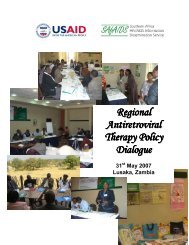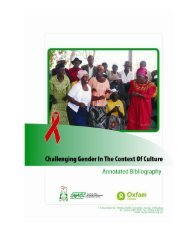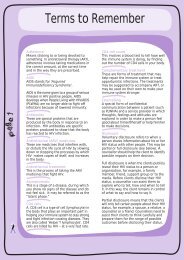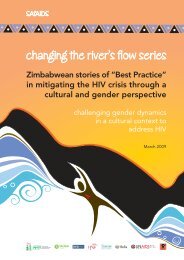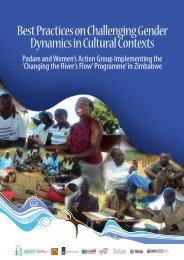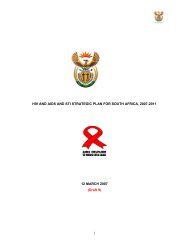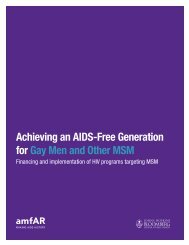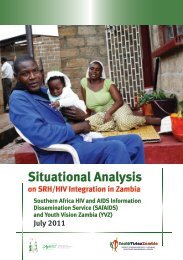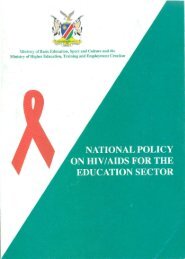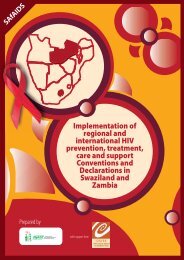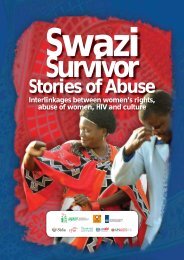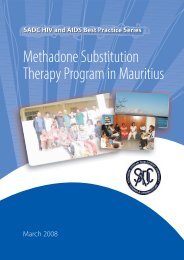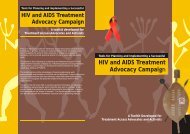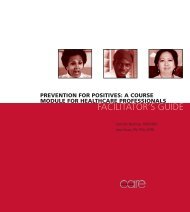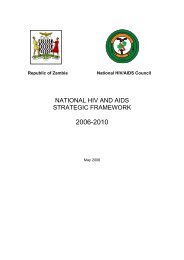African Directory of Health Information Resource Centres - SAfAIDS
African Directory of Health Information Resource Centres - SAfAIDS
African Directory of Health Information Resource Centres - SAfAIDS
You also want an ePaper? Increase the reach of your titles
YUMPU automatically turns print PDFs into web optimized ePapers that Google loves.
Global <strong>Directory</strong> <strong>of</strong> <strong>Health</strong> <strong>Information</strong> <strong>Resource</strong> <strong>Centres</strong><br />
The <strong>Directory</strong><br />
A Note about the Data<br />
This is the first edition <strong>of</strong> the largest global<br />
listing <strong>of</strong> health information resource centres,<br />
with data pertaining to about 1,000 centres. As<br />
an ongoing activity, we aim to refine the data,<br />
and invite all readers to suggest improvements<br />
and provide better information.<br />
Given time and resource constraints, it was<br />
impossible to verify data in any way. The<br />
information was included exactly as it was<br />
submitted by the questionnaire respondent.<br />
Thus, these data are only as good as the<br />
respondents’ knowledge and ability to express<br />
themselves in their chosen language. The HID<br />
project cannot be held responsible for<br />
inaccurate, misleading or out-<strong>of</strong>-date<br />
information in the <strong>Directory</strong>.<br />
The language used by the respondent has largely<br />
been retained (Swahili was used only in a few<br />
cases and, while there was some Spanish and<br />
French, most respondents replied in English).<br />
The original spelling used in the various sources<br />
has been retained, and we are aware that there<br />
are many typographic errors in the present text.<br />
Country and area names conform to UN usage,<br />
with a few exceptions. In particular, please note<br />
that:<br />
‣ Burma is now Myanmar<br />
‣ Democratic People’s Republic <strong>of</strong> Korea comes<br />
under the letter D<br />
‣ The designations Israel and Palestine have<br />
both been used, following the preference <strong>of</strong><br />
the questionnaire respondent<br />
‣ People’s Democratic Republic <strong>of</strong> Lao comes<br />
under the letter P<br />
‣ The Netherlands comes under the letter T<br />
Data Collection Methods<br />
This <strong>Directory</strong> has been created based on a<br />
number <strong>of</strong> sources, which need to be explained so<br />
as to understand the data:<br />
1. Website: A website was established at<br />
http://www.iwsp.org to present all<br />
information relating to the project.<br />
Questionnaires were also developed and<br />
placed on the website. These were provided<br />
in English, French, Russian, Spanish and<br />
Swahili. With considerable promotion on<br />
various lists, people came to the site and left<br />
information regarding their centres.<br />
2. Questionnaires sent by mail or e-mail:<br />
Questionnaires were distributed for us by a<br />
number <strong>of</strong> organizations, namely COHRED<br />
(the Council on <strong>Health</strong> Research for<br />
Development), CIRAN-Nuffic (Indigenous<br />
Knowledge programme), the World <strong>Health</strong><br />
Organization through its library newsletter<br />
WHO Liaison OMS, the newsletter <strong>of</strong> the<br />
health unit <strong>of</strong> the International Network on<br />
the Availability <strong>of</strong> Scientific Publications<br />
(INASP-<strong>Health</strong> Newsletter), and through<br />
various online lists. Questionnaires have been<br />
coming in since May 2000, and no doubt will<br />
continue to arrive. We aim to update the<br />
<strong>Directory</strong> in due course, and thus consider<br />
this to be an ongoing project and resource.<br />
3. Existing Databases. The main provider <strong>of</strong><br />
external database information was the<br />
<strong>Health</strong>link Worldwide Database, although<br />
questionnaires were sent to those on the<br />
database as well, and the data presented was<br />
enhanced based on questionnaire responses.<br />
We also made use <strong>of</strong> a number <strong>of</strong> other<br />
databases, including PRODDER, POPLINE and<br />
IndianNGOs.<br />
Codes used in the <strong>Directory</strong><br />
W = Website<br />
Q = Questionnaire<br />
HLW = <strong>Health</strong>link Worldwide<br />
I = IndianNGOs<br />
P = Prodder and POPLINE<br />
iv



